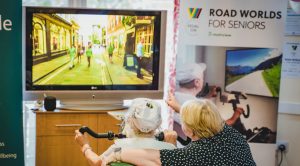
A new study performed by Motitech has discovered that virtual reality (VR) cycling technology can reduce pain, anxiety, and depression in elderly care home residents and boost physical activity levels.
The research, funded by Sport England’s Active Ageing fund, examined the performance of VR cycling technology called “Motiview”, which was developed by Norwegian health tech company Motitech. The investigation highlighted that Motiview profoundly boosts activity levels in elderly care home residents while reducing their risk of mental health problems.
How does Motiview work?
Motiview is an immersive health intervention consisting of an exercise bike that is modifiable to an individual’s functionality levels, videos of local roads, and music that is familiar to the user. The VR cycling technology’s video and sound are played through a TV to create a social setting that brings people together.
Motiview is designed to increase the user’s motivation levels whilst simultaneously stimulating cognitive action and is currently being implemented in around 800 care homes across the UK, North America, Australia, and the Nordics.

Enhancing care home residents’ health
To assess the benefits of VR cycling, the researchers performed a six-month study based on objective activity data and validated questionnaires completed by 415 elderly residents from 25 care homes in the UK.
The results demonstrated that the VR cycling programme resulted in 24% of participating care home residents transitioning from inactive to active over three months and a 14% improvement in “general state of health”.
The increase in physical, cognitive, and social activity resulted in statistically significant decreases in anxiety, depression and pain, and elevated independence. Moreover, many of the benefits achieved through Motiview were observed three months after the intervention ended.
The researchers explained that considering care home residents usually experience rapid health deterioration, with an average of 6.2 diagnoses and length of stay lasting only 26 months before they die, the results are even more impressive. The VR cycling was also found to positively affect care home staff, with team members reporting increased motivation and believing that the activity sessions enriched the staff environment.
Matthew Archer, Motitech’s market and business developer, commented: “There are now around 500,000 care home residents in the UK and, over the last two decades, there has been a marked increase in disability and complex health problems. With an increasingly aged population, this trend is only going to continue, and so it is clear that investment is needed into interventions that support proactive and preventative care.
“The results of this study show that immersive interventions like the Motiview, that combine physical, cognitive, and social activity can achieve significant health outcomes, reducing pain, increasing independence and improving mental wellbeing for older people in care homes. Considering that this is a population that, by its nature, is, unfortunately, experiencing health deterioration all of the time, the improvements here are even more significant.
“With the study showing that the results are still felt by participants three months after the end of the programme, it is clear that engaging with interventions like this, even on a short-term basis, can have long lasting benefits for care home residents, staff and the healthcare system as a whole.”
The full study can be found here.
























